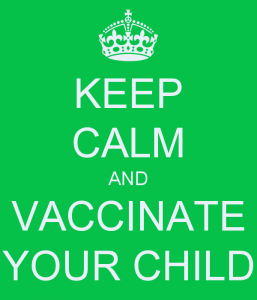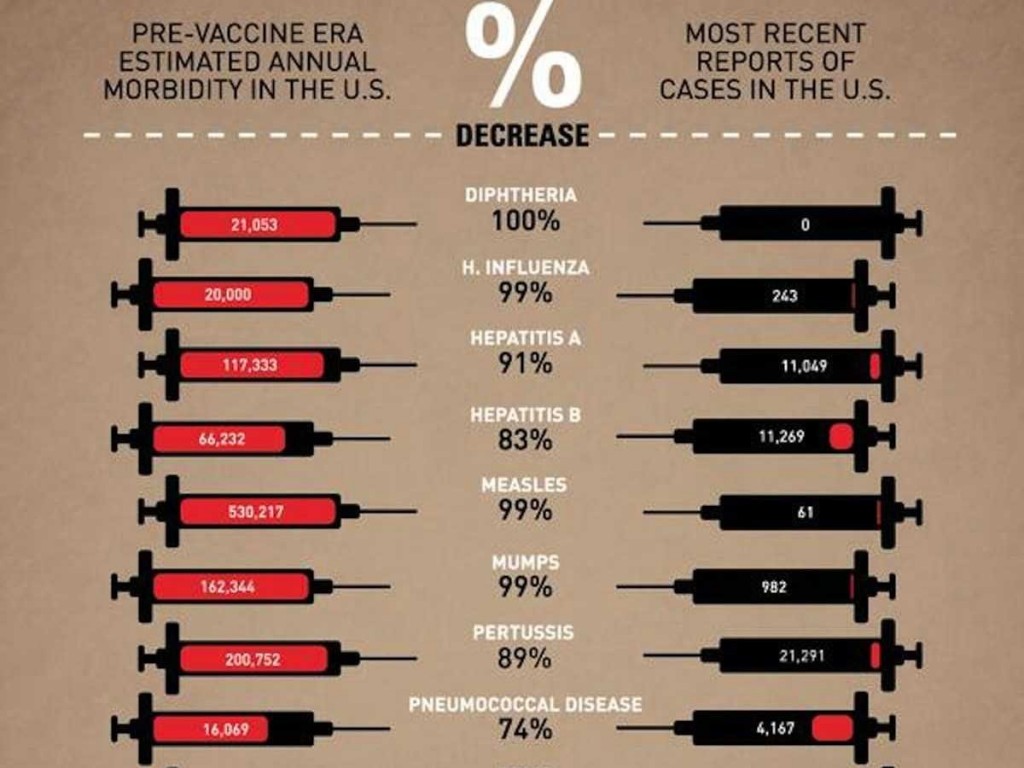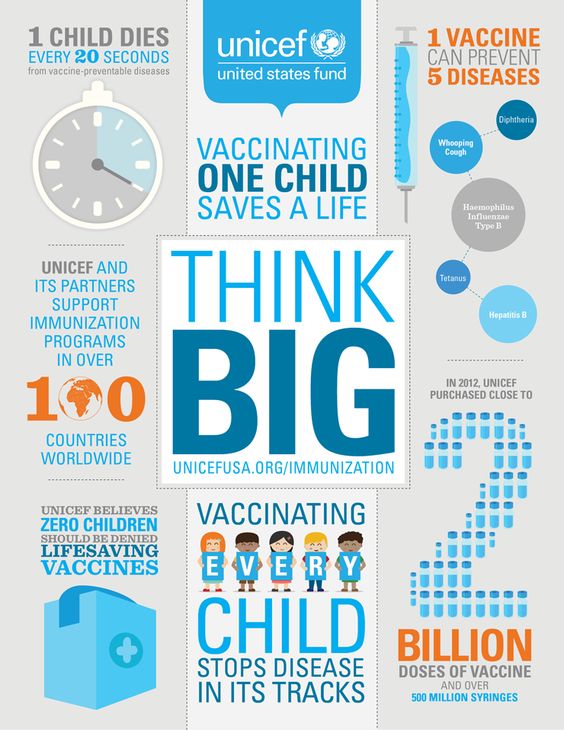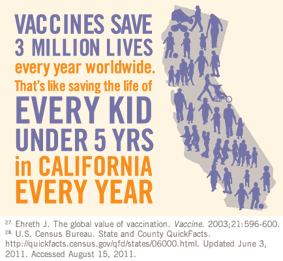Today in the media we all hear about how vaccines are bad. They cause autism, bowel problems and many more issues. Do you ever wonder if these are true facts about vaccines or if they are just myths? Here are some statistics of children who are not being vaccinated:
- Nearly 600 cases of Measles have been report in the year of 2014. According to Dr. Anne Schuchat, “The current increase in measles cases is being driven by unvaccinated people” (Gonzalez, 2014).
- The L.A. Times reported that parents in California are at twice the rate of not vaccinating their children compare to about 7 years ago.
- In 2013, 90% of children who died from the flu were not vaccinated (CDC Reports, 2013).
- In 2008, 93.5% of children were vaccinated for MMR but in 2009 that dropped to 90.6%.
- In 2008, 87.2% of children were vaccinated for chickenpox but in 2009 that dropped to 85.4%.
- In 2008, 92% of children were vaccinated for diphtheria, tetanus, and whooping cough but in 2009 that dropped to 90.6%.
- In 2011, 15, 216 cases of whooping cough were reported due to a lack of vaccinations in children but in 1996, only 7.796 cases were reported (Refusing Protection, 2015).
These facts show how the rates of parents not vaccinating their children are growing throughout the years. With that, more cases of illnesses are growing due to children not being vaccinated. When families travel out of the United States and they are not vaccinated, they don’t realize they are bringing back diseases. With most things in life there are positives and negatives to everything. With that being said, let’s look at all the negatives and myths about vaccines and let’s put them to positives and facts.
Facts vs Myths
Myth: Vaccines cause autism.
Fact: It is a known myth that MMR causes autism and stomach problems. Well this known myth doesn’t exist. With recent studies, it shows that vaccines are not related to serious illnesses (Recame, 2012). Since 2003, there have been 9 funded studies to prove that there is no link between MMR and children who have autism (Vaccines Do Not Cause Autism, 2015).
- So where did this myth come from?
- This came from a study back in the 1990s. Mr. Wakefield tried to conclude that MMR caused crohn’s disease and autism. He stated that 9 out of 12 children who were vaccinated with MMR were diagnosed with autism. This statistic caused an increase of children not getting vaccinated (Recame, 2012).
- In 2004, the Autism Speaks Foundation did a study and showed that 15% of individuals with autism show a genetic link. This proving that autism is related to hereditary factors (Recame, 2012).
Myth: Vaccines cause serious reactions and can cause the child to get the disease.
Fact: The vaccine exposes the child to a weakened or dead virus. The child is experiencing the body’s immune response to the vaccine and it is not the disease itself.
- Less than 1 in 1 million cases show symptoms in children from the vaccine (Understanding Vaccines, 2016).
Myth: Since most children are vaccinated, my child does not need to be vaccinated.
Fact: Vaccines protect the entire community not just the individual person.
- Unvaccinated people are at serious risk for getting diseases and spreading them.
- Even though some are vaccinated and protected, the ones at risk at people with weakened immune systems, children during their vaccination schedules, pregnant women, and infants (since their immune systems are strong enough yet) (Heusel, 2016).
Myth: Since some diseases are not even in the United States anymore, my child doesn’t need those vaccines.
Fact: Just because some of these diseases like polio and diphtheria have been completely gone in the United States, it doesn’t mean it can’t come back.
- Due to traveling and other countries, we can bring back diseases into the United States and without vaccines for it, we are susceptible for getting these diseases and bringing them back into the United States (Heusel, 2016).
- Even though hearing about children getting MMR is rare. In 2003, 13 children died from it because they didn’t get the vaccine.
- Unvaccinated children are more susceptible to getting disease and spreading them to infants and the older adult population who have weakened immune systems (Howard, 2016).
Myth: Vaccines overwhelm my child’s immune system.
Fact: It is a fact that a child can have up to 23 vaccines by the time they are 2 years old. Yes that is overwhelming but not overwhelming to the child’s immune system.
- “Children have an enormous capacity to respond safely to challenges to the immune system from vaccines,” says Dr. Offit. “A baby’s body is bombarded with immunologic challenges—from bacteria in food to the dust they breathe. Compared to what they typically encounter and manage during the day, vaccines are literally a drop in the ocean.” In fact, Dr. Offit’s studies show that in theory, healthy infants could safely get up to 100,000 vaccines at once” (Howard, 2016).
Myth: Vaccines contain preservatives that are dangerous for my child.
Fact: The compound thimerosal contains a form of mercury, ethylmercury and in large quantities it can inhibit a child’s developing brain. This worry changed vaccines in 1999 and it was removed from all vaccines but it is still present in some flu vaccines but they do have thimerosal-free ones.
- According to Dr. Offit, Methylmercury is a metal found in the environment that can cause harm to a child’s brain development and ethylmercury does not because the body is able to eliminate it (Howard, 2016).
Myth: Hygiene and sanitation are better for preventing diseases than vaccines.
Fact: It is true that hygiene and sanitation help prevent diseases. It is also true that vaccines are not 100%. But getting vaccines and using proper sanitization can really help protect children from diseases.
- Even though good hygiene and nutrition are key to being healthy is is proof that vaccines also help with being free of diseases and healthy.
- Back in 1963, there were around 400,000 cases of measles but when the vaccine was introduced that number went down to 25,000 by 1970 (Refusing Protection, 2015).
Why Vaccines are Important
Many years ago, vaccines were the leading cause of death but with the creation of vaccines, children are able to celebrate their birthdays. According to (), they show a table of cases and deaths the year when these diseases were high compared to 2011 with the number of cases reported and the number of deaths. Since vaccines have been created for all of these diseases there hasn’t be one death reported in 2011 when this study was done. Even though there are some side effects to vaccines, those risks don’t outweigh the benefits of vaccines. Vaccines are the reason why children can live longer and healthier lives (Anderson, 2015). It is important to always ask questions about vaccines and the first person to go is your child’s doctor. Doctors and nurses want to support parent’s decisions and give them the proper information about vaccines and how they work (Casey, 2016). In the long run, children can be protected from so many diseases and be a part of eliminating even more diseases in the United States.
Helpful Online Resources:
References
Anderson, V. L. (2015). Promoting Childhood Immunizations. Journal For Nurse Practitioners, 11(1), 1-10.
Casey, G. (2016). Vaccines – how and why they work. Kai Tiaki Nursing New Zealand, 22(1), 20-24.
CDC Reports About 90 Percent of Children Who Died From Flu This Season Not Vaccinated. (2013, March 22). (CDC, Producer) Retrieved August 30, 2016, from Centers for Disease Control and Prevention: http://www.cdc.gov/flu/spotlights/children-flu-deaths.htm
Gonzalez, R. (2014, September 6). CDC Statistics Show What Happens When You Don’t Vaccinate. Retrieved August 30, 2016, from io9: http://io9.gizmodo.com/what-happens-when-you-dont-vaccinate-1631423511
Heusel, C. (2016). Vaccination Facts. (M. Corporation, Producer) Retrieved August 30, 2016, from Parents: http://www.parents.com/health/vaccines/facts/vaccination-facts/
Howard, B. (2016). 10 Vaccine Myths—Busted. (M. Corporation, Producer) Retrieved August 30, 2016, from Parenting: http://www.parenting.com/article/10-vaccine-myths—busted
Recame, M. A. (2012). The Immunization- Autism Myth Debunked. International Journal Of Childbirth Education, 27(4), 76-78.
Refusing Protection: The Decline of Childhood Vaccination in the U.S. (2015). (O. M. Health, Producer) Retrieved August 30, 2016, from Online Masters in Public Health: http://www.onlinemastersinpublichealth.com/vaccination/
Understanding Vaccines. (2016). (P. Health, Producer) Retrieved August 30, 2016, from Public Health: http://www.publichealth.org/public-awareness/understanding-vaccines/vaccine-myths-debunked/
Vaccines Do Not Cause Autism. (2015, November 23). (CDC, Producer) Retrieved August 30, 2016, from Centers for Disease Control and Prevention: http://www.cdc.gov/vaccinesafety/concerns/autism.html






I found this article to be very informative as well as a thorough argument debunking the anti-vaccine movement that has been unfortunately gaining ground. The most interesting part for me was the discussion around why it’s still damaging to have even a relatively small number of people going without vaccination.